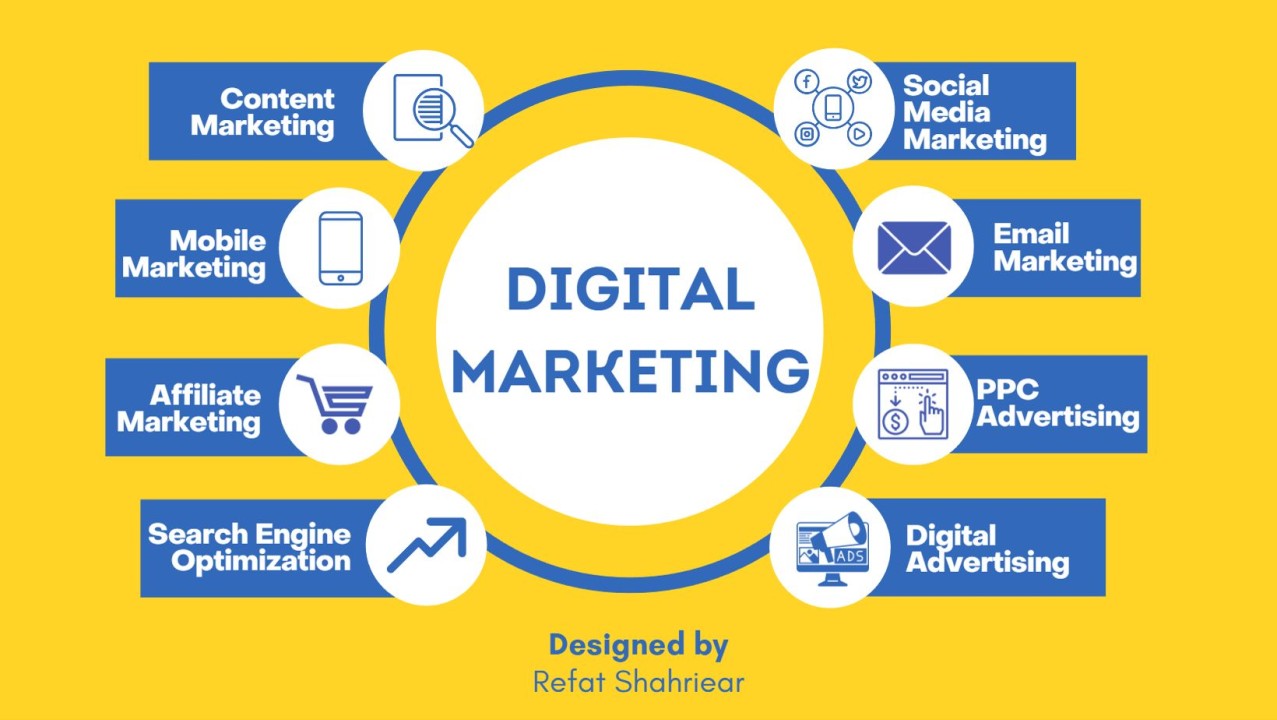Introduction:
In the era of interconnected technologies and global connectivity, digital marketing has emerged as a pivotal force, reshaping the way businesses connect with their audiences. This comprehensive guide explores the multifaceted world of digital marketing, detailing its key components, strategies, and the transformative impact it has on the modern business landscape.
The Essence of Digital Marketing:
Digital marketing encompasses a broad spectrum of online strategies and channels designed to reach and engage target audiences. Unlike traditional marketing, digital marketing leverages the power of the internet and electronic devices to promote products, services, and brands. Its versatility and measurable nature make it an indispensable tool for businesses of all sizes.
Key Components of Digital Marketing:
-
Search Engine Optimization (SEO):
- SEO is the foundation of digital marketing, focusing on optimizing a website’s visibility in search engine results. By employing strategies such as keyword optimization, quality content creation, and backlink building, businesses aim to improve their rankings and attract organic traffic.
-
Content Marketing:
- Content is at the heart of digital marketing. Content marketing involves creating and distributing valuable, relevant content to attract and engage a target audience. This can include blog posts, articles, videos, infographics, and more.
-
Social Media Marketing:
- Social media platforms have become powerful channels for reaching and interacting with audiences. Social media marketing involves creating and sharing content on platforms like Facebook, Instagram, Twitter, and LinkedIn to build brand awareness, foster engagement, and drive website traffic.
-
Email Marketing:
- Email marketing remains a highly effective way to communicate directly with a target audience. Businesses use email campaigns to share updates, promotions, and personalized content, nurturing leads and building customer loyalty.
-
Pay-Per-Click (PPC) Advertising:
- PPC advertising allows businesses to place ads on search engines and other platforms and pay a fee each time their ad is clicked. This model provides a targeted approach to reaching potential customers based on specific keywords, demographics, and interests.
-
Affiliate Marketing:
- Affiliate marketing involves partnering with other businesses or individuals (affiliates) to promote products or services. Affiliates earn a commission for each sale or lead generated through their marketing efforts.
-
Influencer Marketing:
- Influencer marketing leverages the popularity and credibility of individuals with a significant following on social media platforms. Businesses collaborate with influencers to promote their products or services to a wider audience.
-
Analytics and Data Analysis:
- Data is a cornerstone of digital marketing. Analytics tools allow businesses to track and analyze user behavior, measure the success of campaigns, and make informed decisions based on actionable insights.
Strategies for Digital Marketing Success:
-
Define Clear Goals:
- Start by defining clear and measurable goals. Whether it’s increasing website traffic, generating leads, or boosting sales, having well-defined objectives will guide your digital marketing efforts.
-
Know Your Audience:
- Understanding your target audience is crucial. Create detailed buyer personas to tailor your digital marketing strategies to the specific needs, preferences, and behaviors of your audience.
-
Integrated Multichannel Approach:
- Digital marketing is most effective when it utilizes a multichannel approach. Integrate various channels and strategies to create a cohesive and comprehensive online presence.
-
Consistent Branding:
- Maintain consistency in your brand messaging, visual elements, and tone across all digital channels. A cohesive brand identity fosters recognition and trust among your audience.
-
Mobile Optimization:
- With the increasing use of mobile devices, optimizing your digital content for mobile is essential. Ensure that your website, emails, and other content are mobile-friendly to reach a wider audience.
-
Engage with Your Audience:
- Actively engage with your audience through social media, comments, and other interactive features. Building a community fosters brand loyalty and encourages word-of-mouth marketing.
-
Continuous Analysis and Optimization:
- Regularly analyze the performance of your digital marketing efforts. Use analytics tools to track key metrics, identify what works, and optimize your strategies for better results.
The Transformative Impact of Digital Marketing:
-
Global Reach:
- Digital marketing transcends geographical boundaries, allowing businesses to reach a global audience. This level of accessibility opens up new markets and opportunities for expansion.
-
Cost-Effectiveness:
- Compared to traditional marketing channels, digital marketing often proves more cost-effective. With targeted campaigns and measurable results, businesses can allocate resources more efficiently.
-
Real-Time Interaction:
- Digital marketing enables real-time interaction with audiences. Social media comments, live chats, and instant messaging provide opportunities for immediate engagement and feedback.
-
Data-Driven Decision Making:
- The wealth of data available through digital marketing channels empowers businesses to make informed decisions. Analyzing user behavior and campaign performance allows for continuous optimization.
-
Personalization:
- Digital marketing enables personalized communication with individual users. Tailoring content and offers based on user preferences enhances the customer experience and fosters brand loyalty.
Conclusion:
In the digital age, where consumers are increasingly connected and businesses operate on a global scale, digital marketing has become an integral part of any successful marketing strategy. By embracing the diverse array of tools and strategies available, businesses can not only navigate the complexities of the digital landscape but also thrive, connect with their audience, and achieve sustainable growth. As digital marketing continues to evolve, staying agile, data-driven, and customer-centric will be key to unlocking the full potential of this transformative force in the world of marketing.

